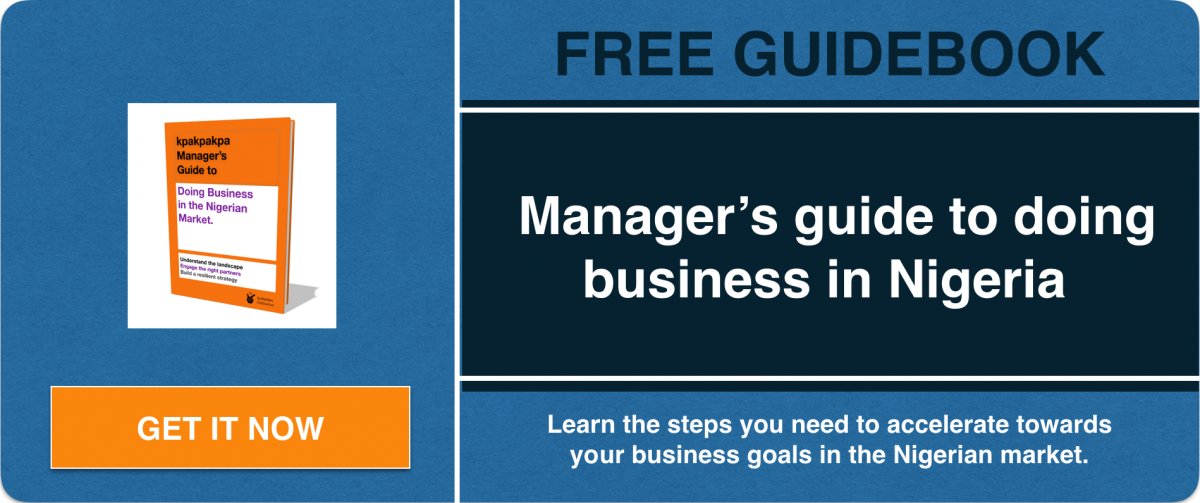As an executive who is interested in investing the fruits of its company’s success into Nigeria’s burgeoning market, you are most likely looking to collect key market information in Nigeria that will help you better understand Nigeria’s unfamiliar market structure for your business.
However, you might have had the somewhat common experience of connecting with the right sources to gain access to market information, only to receive a flood of data that you have to sort through. Sometimes, you might not even have credible data to start with. During this process, you probably found yourself either unsettled about where to begin or overwhelmed as you weed out the superfluous information, and hone in on the data that would ultimately help you develop a robust business strategy for your company.
In an attempt to save you from wasting time, energy, and money, this article will highlight key market information in Nigeria that will inevitably help plan your company’s success as you venture into this market as a new entrant.
Understand the Bigger Picture
It’s helpful to get an overall idea of Nigeria’s current economic standing before zooming in on the finer details of the country’s market. Therefore, taking a look at factors, such as the country’s GDP, economic outlook, political risks and currency stability – fluctuation in exchange rate is very important for executives looking to sell products in Nigeria. All these economic factors can serve as great starting points.
From there, you can also look at Nigeria’s vast and diverse demographics: population, purchasing power, and consumer class. This data will inform the creation of your business strategy, as you move forward with determining who your target customer is in this market.
Get to Know Your Customer Base
As a new entrant, there is a possibility that you might not have a customer base already present in Nigeria. Therefore, it is important that you recognize who your target customer is and study them in an attempt to develop a business strategy that incorporates methods that will help your company market to them effectively. This might even include employing marketing techniques to simply build awareness of your product or service.
It is also necessary to note that marketing techniques that have worked for your customer base in your home country may not work in Nigeria. Therefore, the process of getting to know your target customer is even more of an imperative if you want to market to them successfully. If you are selling to other businesses, employing strategic business-to-business (B2B) marketing initiatives will help you identify and reach key-decision makers at the businesses that you plan on targeting.
Set the Right Price
After conducting research on the purchasing power of your target customer in Nigeria, you will better understand how price-sensitive the Nigerian consumer can be. The average Nigerian consumer is always focused on “value for money”; they want to know how much value they will be getting for the price of a product or service.
Gather price information by surveying competitive prices of similar products and services in the market, and interviewing your prospective customers to settle on an ideal starting price point for your products or services.
Identify Your Competition
To get a better idea of the market structure in order to conduct your business in Nigeria, you should identify your competition. Establishing who your competitors are within the market not only helps you identify your company’s strengths and weaknesses, it also reveals the current market landscape and how the market is structured.
All of the aforementioned market information can be used to form a business strategy that plays to your company’s strengths, works on your business’s weaknesses, and places your enterprise in a strong position to compete within the Nigerian market.
Locate the Major Distributors
If you are a company that sells products, locating the importers and resellers that can help get your goods to market is essential. Distribution in Nigeria is a huge challenge for multinationals because of the bad road infrastructure.
In Nigeria, where 90% of inland transportation is done by road, having a well-established distributor that has the local expertise to move goods around the country will be a huge advantage to your team. Therefore, researching the best importers, distributors, and resellers to work within the area is also a must.
Once you have identified the main importer or reseller you would like to work with, you can move forward with seeking out a partnership with the said company and incorporating that information into your business strategy. The trick here is to find credible partners that you can trust and build a commercial relationship with by properly sourcing and vetting these partners ahead of any engagement with them.
Build Your Awareness of Potential Barriers
Outside of the general market information in Nigeria that you should be aware of, you should also educate yourself in regards to local nuances that can become roadblocks for your business.
Every country has its own culture that shapes the way business is done and the way its citizens consume products and services. Therefore, you should become acquainted with these customs in an attempt to detect potential threats. From there, you can construct a business strategy designed to avoid, or at least overcome these barriers.
Take a holistic approach
When gathering market information in Nigeria, taking a holistic and comprehensive approach is recommended. Combining various factors, such as “high-level” macroeconomic components of the country, as well as “on-ground” local market insights, will better assist you in the creation of a business strategy that will ensure your company’s success as a new entrant and set your organization up for both short- and long-term success in the Nigerian market.


